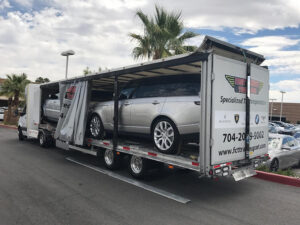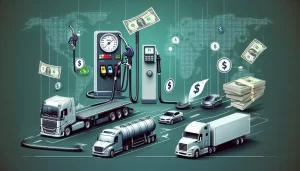Both car haulers and auto transport brokers play important roles in the car shipping industry. They are often mixed up, but they serve different purposes. Here are the main differences Between a Car Hauler and an Auto Transport Broker:
1. Nature of Service: The Fundamental Difference
Car Hauler: The Physical Movers
- Direct Shipping: A car hauler is essentially the company that owns the physical trucks used in shipping cars. They are the ones who handle the actual transportation of your vehicle from point A to point B.
- On-the-Ground Operations: Car haulers are involved in the nitty-gritty of car shipping – loading your car onto their trucks, securing it for transport, and ensuring it reaches its destination safely.
Auto Transport Broker: The Strategic Middlemen
- No Trucks, Big Network: Unlike car haulers, auto transport brokers don’t own trucks or trailers. Their role is more strategic. They act as intermediaries, connecting individuals or businesses needing to ship cars with the car haulers who transport them.
- Facilitating Communication: Brokers are crucial in facilitating communication between you and the car hauler. They handle the logistics, negotiate rates, and ensure your car shipping process is smooth and hassle-free.
2. Liability and Insurance: Who’s Responsible?
Car Hauler: Directly Accountable
- Covering Damages: Car haulers are directly responsible for your vehicle while it’s in their care. They must have motor truck cargo insurance to cover potential damages that might occur due to their negligence during transportation.
- Insurance Claims: If something goes wrong, the car hauler is the one you’ll deal with directly regarding insurance claims and compensation.
Auto Transport Broker: Ensuring Haulers are Covered
- Indirect Responsibility: Brokers themselves don’t have direct responsibility for the vehicles. However, a reputable broker will ensure that the car haulers they work with are adequately insured.
- Assistance with Claims: In case of damages, a good broker will assist you in navigating the claims process, something a car hauler might not be incentivized to do.
3. Customer Interaction: Who Do You Talk To?
Car Hauler: Limited but Crucial Contact
- Pick-Up and Delivery: Your primary interactions with a car hauler will be during the pick-up and delivery phases. This is when you’ll meet the team who physically transports your car.
- Direct Communication: If you have specific concerns about the physical transport of your car, the car hauler is your go-to.
Auto Transport Broker: Your Main Point of Contact
- Continuous Interaction: Brokers are your main point of contact throughout the car shipping process. They’re the ones you’ll talk to when you have questions, need a quote, or have concerns about your shipment.
- Customer Service Focused: Brokers typically place a strong emphasis on customer service. They manage the logistics, keep you informed, and work to ensure your satisfaction throughout the process.
Understanding the Roles: A Closer Look
The Car Hauler’s Day-to-Day
- Operational Challenges: Car haulers deal with the day-to-day challenges of transporting vehicles – from navigating traffic and weather conditions to ensuring each car is securely loaded and unloaded.
- Route Planning: They plan the most efficient routes to deliver multiple cars, often across vast distances, while ensuring each vehicle is delivered in the condition it was received.
The Broker’s Strategic Role
- Finding the Right Match: Brokers spend their time finding the right car hauler for your specific needs. They consider factors like route, vehicle type, and your personal preferences.
- Negotiating Rates: Brokers have the expertise to negotiate competitive rates with car haulers, often getting you a better deal than if you went directly to a hauler.
Choosing Between a Car Hauler and a Broker
When to Choose a Car Hauler
- Direct Control: If you prefer to have direct control over the shipping process and don’t mind handling the logistics, working directly with a car hauler might be for you.
- Specific Requirements: For those with specific requirements or concerns about their vehicle, dealing directly with the hauler can provide peace of mind.
When to Opt for a Broker
- Convenience and Ease: If you want a hassle-free experience where all the logistics are handled for you, a broker is the way to go.
- Lack of Industry Knowledge: For those unfamiliar with the car shipping industry, a broker can provide guidance and ensure you get a fair deal.
Conclusion: Making an Informed Decision
Understanding the difference between a car hauler and an auto transport broker is key to making an informed decision about shipping your car. While car haulers deal with the physical aspect of moving vehicles, auto transport brokers manage the logistics and communication.
If you’re looking to ship a car, consider what’s most important to you – direct control over the process or the convenience of having someone else handle the details. Remember, whether you choose a car hauler or a broker, always do your research to ensure you’re working with a reputable and reliable company.
In the end, whether you opt for the hands-on approach of a car hauler or the strategic facilitation of a broker, understanding these roles will help you navigate the car shipping process with confidence and ease.




